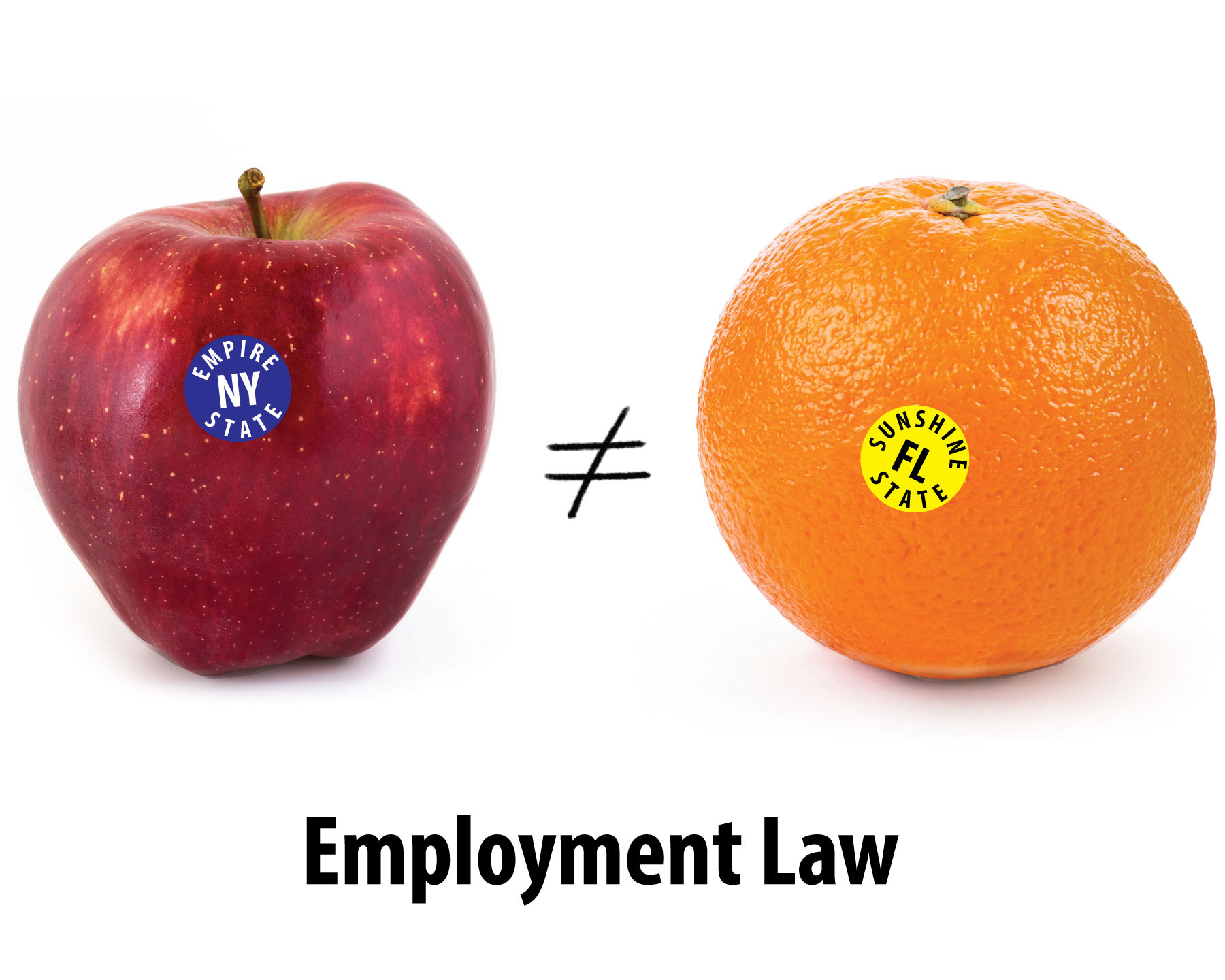By Yaniv Adar and Michelle Genet Bernstein
First published in LAW360, May 20, 2022
The extraordinary circumstances of COVID-19 and rising income taxes triggered a deluge of New Yorkers to South Florida. Businesses and workers alike fled rising tax rates in favor of rising floodwaters, heading south to benefit from Florida’s zero personal income tax and year-round sunshine.
But the humidity is not the only thing that is harsher in Florida: so are the noncompete laws. Employers and employees alike are now appreciating the importance of choice-of-law provisions even more as they inquire into the enforceability of noncompete provisions.
As the country adjusts to post-pandemic life, employees are weighing return-to-office policies and remote work options in determining whether to remain with their current jobs or jump ship in search of greener — or sunnier — pastures.
However, mobility may not be that simple if employers hold the keys to its golden handcuffs. Many employment agreements — particularly in the financial, tech and science fields — contain restrictive covenants, which are clauses that restrict an employee from, among other things, competing with former employees for a certain period of time.
Restrictive covenants can substantially restrain trade and can seriously affect an employee’s post-termination — whether voluntary or involuntary — employment options. And while the Biden administration has indicated its intention of clamping down on restrictive covenants, until that happens the enforceability of noncompetition agreements hinges on applicable state law.[1]
This article examines the similarities and differences between Florida law and New York law regarding the enforceability of restrictive covenants and defenses to enforcement actions.
What New York and Florida Law Have in Common Regarding Restrictive Covenants
On their face, both Florida and New York’s restrictive covenant schemes appear similar. Both states’ noncompete laws contain the following provisions:
- An employer cannot enforce a restrictive covenant unless it is grounded in a legitimate business reason.[2]
- Restrictive covenants must be reasonably limited in time, scope and geographical area.[3]
- An employer may be precluded from enforcing restrictive covenants if it has unclean hands[4] — if it acted unethically or in bad faith — or materially breached the employment agreement, including through a failure to compensate.
Perhaps most significantly, both states require courts to blue-pencil otherwise unenforceable restrictive covenants due to unnecessarily broad terms.[5] Courts blue-pencil contracts by editing or cutting the portions that are void or unenforceable.
That is, if, for example, a restrictive covenant has a temporal period of five years, but a court determines that only three years is necessary to protect the articulated legitimate business interest, both Florida and New York courts are required to rewrite the agreement as if it only had a three-year restricted period.
In other words, employers are statutorily permitted to overswing in their noncompete agreements subject to blue-pencil safety net protections.
How New York and Florida Differ Regarding Restrictive Covenants
The difference between New York and Florida can be summed up as follows: Florida favors employers and New York favors employees.
First, New York law specifically requires employers to prove that enforcing a restrictive covenant will not impose an undue burden on affected employees.[6] Contrast this with Florida law, which, as discussed below, statutorily prohibits judges from considering the burden on employees.[7]
Second, New York courts narrowly construe contracts that favor protecting an employer’s business interests.[8] Florida requires the exact opposite, and precludes courts from even construing employment agreements against the employers.[9]
Third, New York law applies a three-prong test to determine whether a restrictive covenant is reasonable: (1) it is no greater than is required for the protection of the legitimate interest of the employer, (2) it does not impose undue hardship on the employee, and [3] it is not injurious to the public.[10]
A violation of any prong renders the covenant invalid.[11] Florida flips the burden of persuasion onto the employee once an employer establishes a single legitimate business interest[12] — which, by statute, are unlimited.[13]
In contrast to New York, Florida protects employers by including onerous provisions in its restrictive covenant statutory scheme.
First, Florida law requires judges to construe contracts in favor of protecting an employer’s business interests, precluding application of rules of contract interpretation that would require the construction of a restrictive covenant narrowly or against the restraint or drafter — typically, the employer.[14]
Second, Florida law forbids judges from considering personal hardship in deciding whether to enforce a restrictive covenant.[15]
Third, Florida law requires a party seeking to enforce a restrictive covenant only to make a prima facie showing that the restraint is necessary to protect a legitimate business interest, at which point the burden shifts to the employee to prove that the restraint is overbroad or unnecessary.[16]
The differences between Florida and New York’s noncompete laws are so extreme that the New York Court of Appeals in 2015 in Brown & Brown Inc. v. Johnson refused to enforce a Florida choice-of-law provision in an employment contract because it deemed Florida’s restrictive covenant laws “truly obnoxious.”[17] Specifically, the court held that the application of Florida law to a nonsolicitation provision “would be offensive to a fundamental public policy” of the state.[18] Florida federal courts, however, readily apply New York law.[19]
Well-Drafted Employment Contracts Are Critical
With critical differences in Florida and New York law, employers and employees alike should carefully consider the provisions in their employment contracts. Most relevant to this article is to ensure that the parties clearly and unambiguously include choice-of-law provisions that are strategically chosen and enforceable.
Arbitration is another factor that should be carefully considered. While previously a must-have for employers, with the rise of mass arbitration, increasing cost of arbitral fees, relevance of litigation funders, the potential difficulty in obtaining immediate injunctive relief, and losing the protection of the right to appeal a rogue sole adjudicator’s decision, employers should think twice about whether to compel arbitration.
If employers are intent on including mandatory arbitration provisions in their employment contracts, they should consider, in addition to choice of law, designating a forum that specializes in employment-related disputes and can administer such disputes competently and efficiently. The parties also may incorporate specific arbitral rules that permit immediate injunctive relief, limit discovery, and provide for recovery of reasonable attorney fees and costs to the prevailing party.
Perhaps more importantly, drafters of restrictive covenant agreements should be mindful of their chosen jurisdiction’s statutory or common-law presumptions of reasonableness.
For example, in Florida, restrictive covenants predicated on the enforcement of trade secrets of less than five years are presumptively reasonable and those greater than 10 years are presumptively unreasonable.[20] Crafting restrictive covenants that address these presumptions will preclude enforceability issues later down the road.
Similarly, employment contracts should clearly and unambiguously state the legitimate business interests protected by the restrictive covenant. Outlining these interests at the onset of a relationship will ensure all parties understand the nature of the restrictive covenant and can reduce unnecessary litigation upon termination of the employment relationship.
Tips for Employers
Seeking to protect your legitimate business interests and enforce your restrictive covenants? Consider the following tips:
- Act fast: The longer you wait to enjoin a violative employee, the less likely you are to obtain injunctive relief.
- Do not overswing: While New York and Florida both have blue-pencil provisions, judges do not like enforcing noncompetes in favor of Scrooge McDuck. Be reasonable. Do not be a Scrooge McDuck.
- Ask if it is worth it: Assess whether the juice is worth the squeeze. Although you may legally be entitled to enforce a noncompete, consider whether the costs will outweigh the benefits. Not only is obtaining a temporary restraining order expensive, prosecuting a noncompete is even more expensive. Also, the best defense is usually offense and savvy defense lawyers will often counterclaim for damages.
- Go after the competitor: Employees often have collectability issues, but a competitor that poached your employee may separately be on the hook for tortious interference or aiding and abetting breach of applicable employment agreements.
- Keep your hands clean: If you acted like a jerk prior to the termination, you open yourself up to equitable defenses and potential counterclaims. That is, if you owe your employee a bonus or other form of deferred compensation, pay the employee. An employee can use your withholding of accrued compensation as grounds for asserting defenses of unclean hands and prior material breach.
Tips for Employees
The long and the short of it is that employees should seek to avoid employment contracts that include restrictive covenants whenever possible, especially if portability is important and especially if Florida law applies.
- If employers insist on restrictive covenants, counsel for both the employer and employee should ensure that the covenants are reasonable in scope and that the contract specifies in unambiguous terms the extent to which certain breaches will be deemed material and essential to the viability of the entire contract.
- Employees also should be wary of conduct that constitutes a breach of a restrictive covenant, even if they did not specifically intend to do so. They should be careful with saving locally confidential or proprietary information, as digital footprints are discoverable and employers have access to forensic experts that can relatively easily prove a breach.
- The parties also should include some form of a liquidated-damages provision for any breach of a restrictive covenant. This will enable the employee to extricate themself from the restrictive covenant for a defined amount.
- More good news for employees is that both Florida and New York recognize the defenses of prior material breach and unclean hands in actions to enforce restrictive covenants. The prior-breach doctrine is predicated on the principal that when a contracting party commits a breach of the contract, the counterparty is discharged of its obligations under the contract.
- For example, an employer’s failure to comply with compensation obligations is likely to be material. That is, an employer will be precluded from seeking preliminary injunctive relief to enforce restrictive covenants against an employee if the employer fails to pay compensation owed to the former employee or breached some other material term of employment.
In 2005 in Northern Trust Investments NA v. Domino, one of Florida’s appellate courts held: “If the employer wrongfully refuses to pay the employee his compensation, the employee is relieved of any further obligation under the contract and the employer cannot obtain an injunction.”[21]
Conclusion
In sum, the choice-of-law provision in employment agreements matters. Those looking to relocate should consider the applicable law and prepare accordingly.
Contact Yaniv Adar or Michelle Genet Bernstein if you have any questions.
See original article on LAW360
_______________________________________
[1] See, e.g., https://www.federalregister.gov/documents/2021/07/14/2021-15069/promoting-competition-in-the-american-economy.[2] § 542.335(1)(b), Fla. Stat.; BDO Seidman v. Hirshberg , 93 N.Y.2d 382, 388-89 (1999)(articulating three-prong test for enforcing restrictive covenants).
[3] § 542.335(1), Fla. Stat.; BDO Seidman, 93 N.Y. 2d at 389.
[4] Leedom Mgmt. Group, Inc. v. Perlmutter , 8:11-CV-2108-T-33TBM, 2012 WL 1883765, at *7 (M.D. Fla. May 22, 2012) (refusing to strike affirmative defense of unclean hands in context of
[5] § 542.335(1)(c), Fla. Stat.; BDO Seidman, 93 N.Y.2d at 394 (1999) (“this Court expressly recognized and applied the judicial power to sever and grant partial enforcement for an overbroad employee restrictive covenant”).
[6] BDO Seidman, 93 N.Y. 2d at 388-89.
[7] § 542.335(1)(g), Fla. Stat. (“In determining the enforceability of a restrictive covenant, a court: Shall not consider any individualized economic or other hardship that might be caused to the person against whom enforcement is sought.”)
.[8] BDO Seidman, 93 N.Y. 2d at 388-89.
[9] § 542.335(1)(h), Fla. Stat. (“A court shall not employ any rule of contract construction that requires the court to construe a restrictive covenant narrowly, against the restraint, or against the drafter of the contract.”).
[10] BDO Seidman, 93 N.Y. 2d at 388-89.
[11] Id.
[12] § 542.335(1)(c), Fla. Stat. (“If a person seeking enforcement of the restrictive covenant establishes prima facie that the restraint is reasonably necessary, the person opposing enforcement has the burden of establishing that the contractually specified restraint is overbroad, overlong, or otherwise not reasonably necessary to protect the established legitimate business interest or interests.”).
[13] § 542.335(1)(b), Fla. Stat. (providing that the list of statutorily enumerated legitimate business interests is non-exhaustive.
[14] § 542.335(1)(h), Fla. Stat.
[15] § 542.335(1)(g)(1), Fla. Stat.
[16] § 542.335(1)(c), Fla. Stat.
[17] Brown & Brown v. Johnson , 25 N.Y.3d 364 (2015) (holding that Florida’s non-compete statute is “truly obnoxious.”).
[18] Id. at 370 (“Considering Florida’s nearly-exclusive focus on the employer’s interests, prohibition against narrowly construing restrictive covenants, and refusal to consider the harm to the employee—in contrast with New York’s requirements that courts strictly construe restrictive covenants and balance the interests of the employer, employee and general public—defendants met their heavy burden’ of proving that application of Florida law to the non-solicitation provision of the parties’ agreement would be offensive to a fundamental public policy of this State.) (cleaned up).
[19] E.g., International Markets Live, Inc., 2020 WL 9219150 (S.D. Fla. Nov. 25, 2020).
[20] § 542.335(1)(d), Fla. Stat.
[21] No. Trust Invs., N.A. v. Domino , 896 So. 2d 880 (Fla. 4th DCA 2005).




